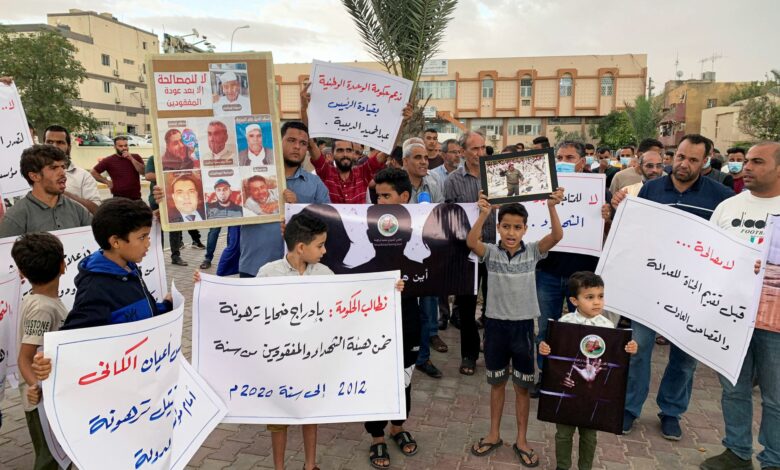
TARHOUNA, Libya, Oct 13 (Reuters) – Workers in the Libyan city of Tarhouna have spent more than a year exhuming bodies from mass graves that show the cost of a decade of conflict and the high stakes of a fragile peace plan that has left victims on the sidelines.
Tarhouna was held by the local Kaniyat militia from 2012 until its capture last year by pro-Tripoli government forces, leaving a grisly legacy that symbolises the North African country’s lost decade of anarchy and violence.
As a peace process has unfolded this year aimed at holding both presidential and parliamentary elections, the people of Tarhouna know they stand little chance of justice if Libya remains divided between warring factions.
But some also fear that the compromises required to stop the process falling apart could mean forgetting past crimes or even elevating those who ordered or abetted them.
“They killed all who refused to cooperate with them. They left no children or women. They left no one,” said Mabrouka Saleh Abu Kleish, 76, describing the tyranny of a group, named for the local Kani family, that killed her brother and two sons.
Families of the dead and missing congregate each Saturday at the main roundabout of the city, where many buildings are still war-damaged and burned out, to seek a fuller investigation and bolder efforts to bring the killers to justice.
Not far away, workers in white contamination suits are still uncovering bodies from Tarhouna’s red soil, with 203 bodies found and 52 identified. City residents have filed 375 missing persons reports so far.
Usama al-Suwaih, an engineering lecturer, was among those protesting. He said the Kaniyat seized his brother from a Tripoli prison in 2013, brought him back to Tarhouna and summarily executed him in his prison clothes.
Two years later the militia fired on his family’s house with a tank, killing his father, he said. His part of the family fled, unable to return until the Kaniyat left last summer. But meanwhile three of this brothers, two uncles and two cousins were killed by the group, Suwaih said. One was accused of not offering condolences to the Kaniyat upon a family death.
“What made things worse was the discovery of mass graves in a rubbish dump, which is still operating,” he said.
MASS GRAVES
Since the 2011 NATO-backed uprising that toppled Muammar Gaddafi, most of Libya has been held by armed groups that control territory, economic institutions and criminal rackets, sometimes switching between the warring sides in the conflict.
In recent years, the Kaniyat were allied to Khalifa Haftar’s Libyan National Army (LNA), and after Tarhouna – around 65 km (40 miles) southeast of the capital Tripoli – fell in June 2020, they retreated with him back to the east of the country.
Haftar’s military defeat set in motion Libya’s latest peace effort, which includes a ceasefire alongside an interim unity government and a push for national elections in December.
The Government of National Unity in Tripoli is working with the state prosecutor and U.N. investigators, but Tarhouna families say progress in identifying remains is slow. Despite arrest warrants, the perpetrators stand beyond their reach.
Though Kaniyat leader Mohammed al-Kani was shot dead in July in Benghazi by an LNA unit, U.N. investigators have said, most of his comrades remain at large, and analysts have said they are in the east under LNA protection.
A spokesman for the LNA were not immediately available for comment on the militia’s status in the east, and no official there has made public comment on the killing of Kani.
Meanwhile, LNA leader Haftar, who is seen by some Tarhouna townspeople as ultimately responsible for the later years of the Kaniyat’s bloody reign, has indicated he plans to run for president.
It is a contingency that Abu Kleish cannot brook – showing how a peace process that has allowed prominent war leaders to retain power may do little to heal Libya’s divisions.
“If they install Haftar as a president, he will put the entire Libyan people in mass graves,” she said.
Suwaih and some other Tarhouna residents fear the focus on Haftar will divert attention from the Kaniyat militia and mean that crimes it committed before its alliance with the LNA will be brushed aside.
However, he is excited about the prospect of parliamentary elections – still an uncertain prospect as factions wrangle over the rules – as a way to replace a political class that he says has turned a blind eye to abuse.
“Elections will bring justice to the Tarhouna case,” he said.
Reporting by Reuters Libya newsroom, writing by Angus McDowall, editing by Mark Heinrich




